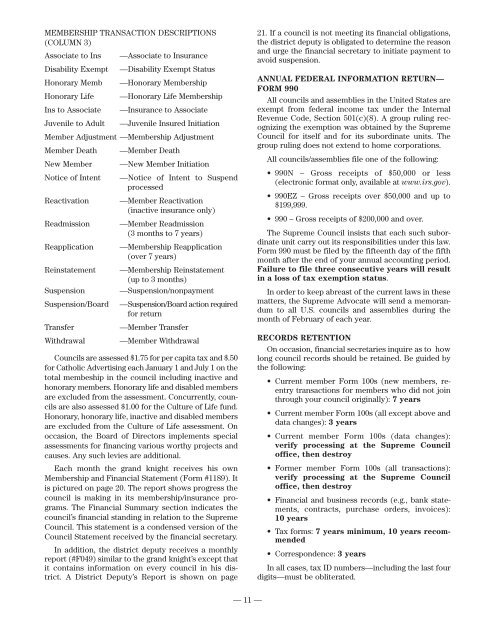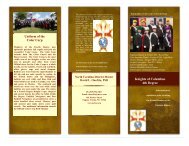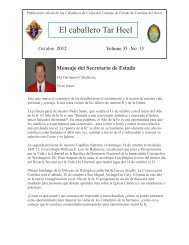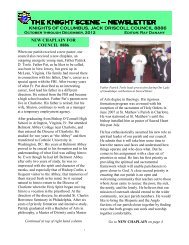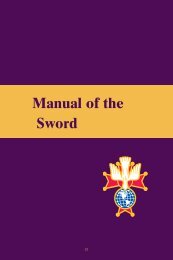Financial Secretary Handbook - Knights of Columbus, Supreme ...
Financial Secretary Handbook - Knights of Columbus, Supreme ...
Financial Secretary Handbook - Knights of Columbus, Supreme ...
Create successful ePaper yourself
Turn your PDF publications into a flip-book with our unique Google optimized e-Paper software.
MEMBERSHIP TRANSACTION DESCRIPTIONS<br />
(COLUMN 3)<br />
Associate to Ins —Associate to Insurance<br />
Disability Exempt —Disability Exempt Status<br />
Honorary Memb —Honorary Membership<br />
Honorary Life —Honorary Life Membership<br />
Ins to Associate —Insurance to Associate<br />
Juvenile to Adult —Juvenile Insured Initiation<br />
Member Adjustment —Membership Adjustment<br />
Member Death —Member Death<br />
New Member —New Member Initiation<br />
Notice <strong>of</strong> Intent —Notice <strong>of</strong> Intent to Suspend<br />
processed<br />
Reactivation —Member Reactivation<br />
(inactive insurance only)<br />
Readmission —Member Readmission<br />
(3 months to 7 years)<br />
Reapplication —Membership Reapplication<br />
(over 7 years)<br />
Reinstatement —Membership Reinstatement<br />
(up to 3 months)<br />
Suspension —Suspension/nonpayment<br />
Suspension/Board —Suspension/Board action required<br />
for return<br />
Transfer<br />
—Member Transfer<br />
Withdrawal —Member Withdrawal<br />
Councils are assessed $1.75 for per capita tax and $.50<br />
for Catholic Advertising each January 1 and July 1 on the<br />
total membeship in the council including inactive and<br />
honorary members. Honorary life and disabled members<br />
are excluded from the assessment. Concurrently, councils<br />
are also assessed $1.00 for the Culture <strong>of</strong> Life fund.<br />
Honorary, honorary life, inactive and disabled members<br />
are excluded from the Culture <strong>of</strong> Life assessment. On<br />
occasion, the Board <strong>of</strong> Directors implements special<br />
assessments for financing various worthy projects and<br />
causes. Any such levies are additional.<br />
Each month the grand knight receives his own<br />
Membership and <strong>Financial</strong> Statement (Form #1189). It<br />
is pictured on page 20. The report shows progress the<br />
council is making in its membership/insurance programs.<br />
The <strong>Financial</strong> Summary section indicates the<br />
council’s financial standing in relation to the <strong>Supreme</strong><br />
Council. This statement is a condensed version <strong>of</strong> the<br />
Council Statement received by the financial secretary.<br />
In addition, the district deputy receives a monthly<br />
report (#F049) similar to the grand knight’s except that<br />
it contains information on every council in his district.<br />
A District Deputy’s Report is shown on page<br />
21. If a council is not meeting its financial obligations,<br />
the district deputy is obligated to determine the reason<br />
and urge the financial secretary to initiate payment to<br />
avoid suspension.<br />
ANNUAL FEDERAL INFORMATION RETURN—<br />
FORM 990<br />
All councils and assemblies in the United States are<br />
exempt from federal income tax under the Internal<br />
Revenue Code, Section 501(c)(8). A group ruling recognizing<br />
the exemption was obtained by the <strong>Supreme</strong><br />
Council for itself and for its subordinate units. The<br />
group ruling does not extend to home corporations.<br />
All councils/assemblies file one <strong>of</strong> the following:<br />
• 990N – Gross receipts <strong>of</strong> $50,000 or less<br />
(electronic format only, available at www.irs.gov).<br />
• 990EZ – Gross receipts over $50,000 and up to<br />
$199,999.<br />
• 990 – Gross receipts <strong>of</strong> $200,000 and over.<br />
The <strong>Supreme</strong> Council insists that each such subordinate<br />
unit carry out its responsibilities under this law.<br />
Form 990 must be filed by the fifteenth day <strong>of</strong> the fifth<br />
month after the end <strong>of</strong> your annual accounting period.<br />
Failure to file three consecutive years will result<br />
in a loss <strong>of</strong> tax exemption status.<br />
In order to keep abreast <strong>of</strong> the current laws in these<br />
matters, the <strong>Supreme</strong> Advocate will send a memorandum<br />
to all U.S. councils and assemblies during the<br />
month <strong>of</strong> February <strong>of</strong> each year.<br />
RECORDS RETENTION<br />
On occasion, financial secretaries inquire as to how<br />
long council records should be retained. Be guided by<br />
the following:<br />
• Current member Form 100s (new members, reentry<br />
transactions for members who did not join<br />
through your council originally): 7 years<br />
• Current member Form 100s (all except above and<br />
data changes): 3 years<br />
• Current member Form 100s (data changes):<br />
verify processing at the <strong>Supreme</strong> Council<br />
<strong>of</strong>fice, then destroy<br />
• Former member Form 100s (all transactions):<br />
verify processing at the <strong>Supreme</strong> Council<br />
<strong>of</strong>fice, then destroy<br />
• <strong>Financial</strong> and business records (e.g., bank statements,<br />
contracts, purchase orders, invoices):<br />
10 years<br />
• Tax forms: 7 years minimum, 10 years recommended<br />
• Correspondence: 3 years<br />
In all cases, tax ID numbers—including the last four<br />
digits—must be obliterated.<br />
— 11 —


